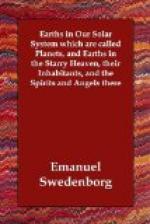these observations, and said, that if one learns to
think in that way one proceeds in inverted order:
adding, that if any one wants to be foolish, he has
only to proceed in that way; and that one should constantly
think of use, and from what is interior. He next
showed me what idea he had had of the Supreme Deity.
He had represented Him to himself as having a human
face, and encompassed about the head with a radiant
circle; but he now knew that the Lord is Himself that
Man, and that the radiant circle is the Divine [proceeding]
from Him, which inflows not only into heaven but also
into the universe, disposing and ruling both.
He added, that He who disposes and rules heaven, disposes
and rules the universe also, because the one cannot
be separated from the other. He also said, that
he believed in only one God, whose attributes and qualities
men distinguished by names as numerous as the gods
they worshipped. A woman appeared to me who stretched
out her hand, desiring to stroke his cheek. When
I expressed my surprise at this, he said, that while
he was in the world such a woman had often appeared
to him, and as it were stroked his cheek, and that
her hand was beautiful. The angelic spirits said
that such women sometimes appeared to the ancients,
and that they called them Pallases; and that the one
who appeared to him was from spirits who, when they
lived as men in the ancient times, were delighted
with ideas and indulged in thoughts, but without philosophy;
and as such spirits were with him, and were delighted
with him because he thought from what is interior,
they representatively exhibited such a woman to his
view. Lastly, he told me what idea he had had
concerning the soul or spirit of man, which he called
Pneuma, namely, that it was an invisible vital [principle],
like something of the ether. He said that he
knew his spirit would live after death, since it was
his interior essence, which cannot die, because it
can think; and moreover that he could not think clearly
concerning it, but only obscurely, because he had
not possessed any knowledge on the subject except
from himself, with a little also from the Ancients.
Aristotle, it may be remarked, is among sane spirits
in the other life, but many of his followers are among
the foolish.
39. I once saw that some spirits of our Earth
were with some spirits of Mercury, and I heard them
conversing with one another; and on this occasion
the spirits of our Earth asked them, among other things,
in whom they believed. They replied that they
believed in God. But when they inquired further
concerning the God in whom they believed, they would
not say, since it is their custom not to give direct
answers to questions. Then the spirits from the
earth Mercury, in their turn, asked the spirits from
our Earth in whom they believed. They said that
they believed in the Lord God. The spirits of
Mercury then said they perceived that they believed
in no God, and that they had contracted a habit of




